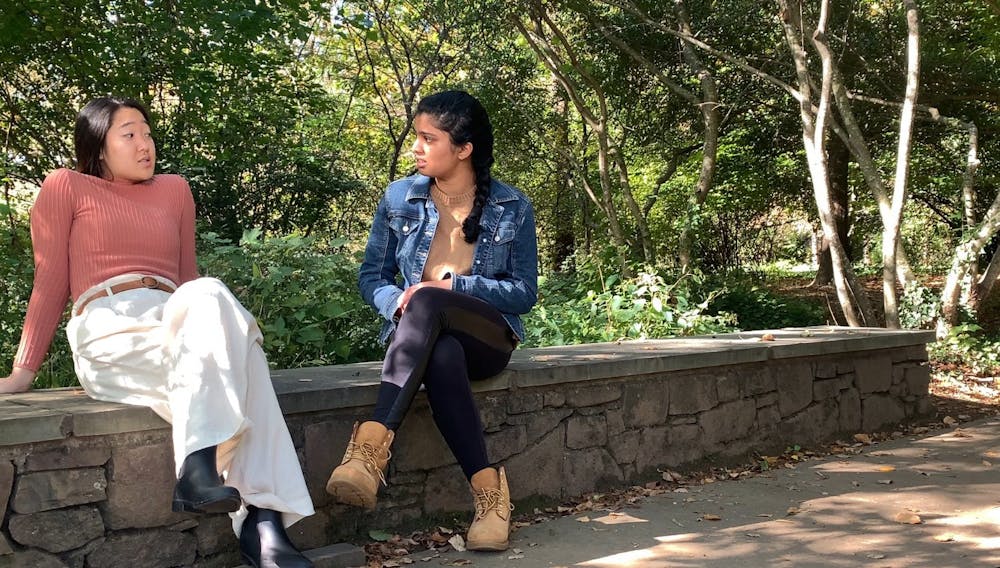The University Drama Department debuted their completely virtual presentation of Caryl Churchill’s “Love and Information,” led by artistic directors Dave Dalton and Mona Kasra, Nov. 11-12. The show — composed of seven acts — featured student-directed vignettes and was streamed online.
“For me, I’ve had some experience with short films,” second-year College student Miles Jackson said. “I was fairly experienced in that regard, but a lot of people were not at all.”
Jackson, along with the rest of the students in the ensemble, had the dual responsibilities of both acting in and directing different scenes from the play. Students who had not previously been exposed to film production received a crash course in lighting and filming techniques.
For all the students involved, the streaming event was their first time seeing the full finished product. The two-hour film was composed of 64 different scenes, each involving inter- or intra-personal relationships. Despite its name, “Love and Information,” it did not feature the elements one might expect of more traditional love-focused plays, save for a few scenes.
The student ensemble of actors brought depth and emotion to a shallow script — for those unaware, the play has no characters and no plot. Instead, it is written like a collection of poems. Some are long and some are short. However, despite all attempts to build the emotional stakes of the show, the scenes tended to be too short to get invested in each character. What made it even harder was that the scenes and characters had no names, which makes it difficult to distinguish scenes that share the same actors from one another. Despite this, the scenes were shot quite dynamically and beautifully, especially considering students had to abide by social distancing rules and the University’s health protocols.
“In some scenes, I’d film in the library and it’s just rules, you need [to wear] your mask,” third-year College student Karen Zipor said.
Zipor was an ensemble member, but also had the responsibility of directing and filming. In other scenes, Zipor said she had the opportunity to use the University’s regulations to unexpected advantage.
“I think a lot of physical comedy can be enhanced by some social distancing,” Zipor said.
Much of the cinematography in “Love and Information” was impressive. The camera work in one scene Zipor described — where two fangirls are shown in separate nooks six feet apart and throw magazines at each other during an argument — stood out as a moment of well-shot physical comedy. In the first scene of the second act, a Vertigo shot — a camera trick where objects in the foreground appear still while objects in the background morph in size — was utilized quite masterfully. Other scenes are edited where a character is looking into a mirror and their reflection isn’t particularly interested in reflecting, instead moving differently than the person on the other side of the mirror. Along with slick visual effects, some scenes heavily rely on lighting and crafty camera angles to convey a sense of mood.
The drama department took on a lofty goal of virtually presenting what would have been a traditional stage play in a pandemic-free semester. Rather than professors Dalton and Kasra directing the entire show, students chose scenes that they wanted to direct and had the responsibility of casting, lighting, filming and sometimes even acting in the scene. Typically a faculty member of the drama department directs the mainstage show. The artistic directors were there to make sure that the entire film had a consistent feel from scene to scene.
“It’s really the challenge of [COVID-19] that pushed us to do more video and more digital media,” Dalton said at the “Love and Information” talkback that occurred after the 7 p.m. Wednesday premiere.
When asked about why this project was better suited for the drama department instead of the Media Studies department, Aspen Miller — a 2017 alumnus and filmmaking mentor for the production — responded.
“I ended up choosing the drama department in terms of major because the media studies department is a lot of thought and a lot of practice, but not a lot of application,” Miller said.
He aided the artistic directors for “Love and Information” by teaching the student ensemble filming and editing techniques. He even filmed a few scenes himself.
“That’s what I love about the drama department ‘cause there was this big open opportunity for students to get up and go, ‘Hey, I'm going to make this thing!’”
In the end, the drama department delivered much more than a virtual adaptation of “Love and Information.” Students got more creative freedom than they would have in a regular semester. After learning practical filmmaking skills and earning directorial experience, the student ensemble will leave this experience more prepared than ever for the digital world. With the New Works Festival approaching in the spring, it will be exciting to see how the drama department aims to recreate the tech-savvy debut of their first major virtual show.







